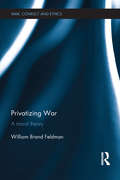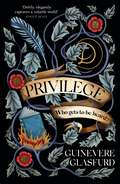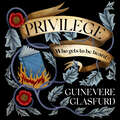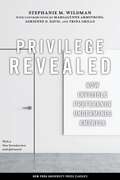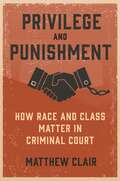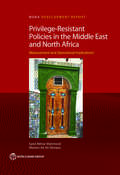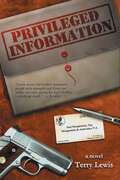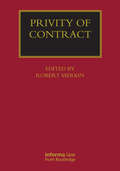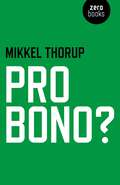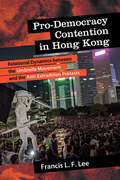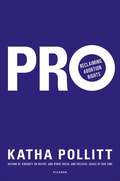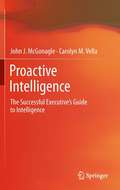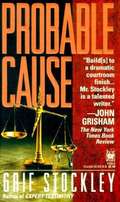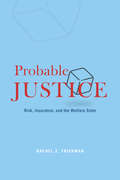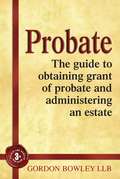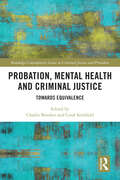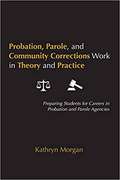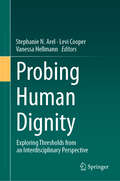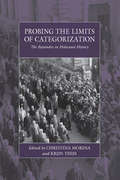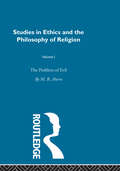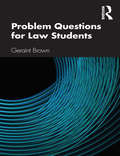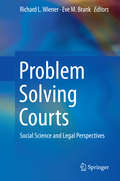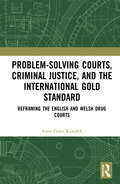- Table View
- List View
Privatizing War: A Moral Theory (War, Conflict and Ethics)
by William FeldmanThis book offers a comprehensive moral theory of privatization in war. It examines the kind of wars that private actors might wage separate from the state and the kind of wars that private actors might wage as functionaries of the state. The first type of war serves to probe the ad bellum question of whether private actors can justifiably authorize war, while the second type of war serves to probe the in bello question of whether private actors can justifiably participate in war. The cases that drive the analysis are drawn from the rich and complicated history of private military action, stretching back centuries to the Italian city-states whose mercenaries were reviled by Machiavelli. The book also takes up the hypothetical examples conjured by philosophers—the private protective agencies of Robert Nozick’s Anarchy, State, and Utopia, for example, and the private armies of Thomas More’s Utopia. The aim of this book is to propose a theory of privatization that retains currency not only in assessing current military engagements, but past and future ones as well. In doing so, it also raises a set of important questions about the very enterprise of war. This book will be of much interest to students of ethics, political philosophy, military studies, international relations, war and conflict studies, and security studies.
Privilege
by Guinevere Glasfurd'Tightly plotted and hugely readable' Jane Rogers, author of PROMISED LANDS'Marvellous . . . fans of immersive historical fiction, the 18th century, all things French and a dash of peril, this one's for you' Emily Brand, author of THE FALL OF THE HOUSE OF BYRON'Glasfurd deftly, elegantly captures this volatile world of impoverished attic rooms and gilded literary salons' DAILY MAIL'I thought of the books we carried and the hands that would one day hold them. The pages read, turned and discussed. And how the book would become thought and the thought then become the person gone out into the world. Let Gilbert try and put a stop to that.'After her father is disgraced, Delphine Vimond is cast out of her home in Rouen and flees to Paris. Into her life tumbles Chancery Smith, apprentice printer sent from London to discover the mysterious author of potentially incendiary papers marked only D. In a battle of wits with the French censor, Henri Gilbert, Delphine and Chancery set off in a frantic search for D's author. But who is D and does D even exist?Privilege is a story of adventure and mishap set against the turmoil of mid-18th century France at odds with the absolute power of the King who is determined to suppress opposition on pain of death. At a time when books required royal privilege before they could be published - a system enforced by the Chief Censor and a network of spies - many were censored or banned, and their authors harshly punished. Books that fell foul of the system were published outside France and smuggled back in at great risk.Costa-shortlisted author Guinevere Glasfurd has conjured a vibrant world of entitlement and danger, where the right to live and think freely could come at the highest cost.
Privilege
by Guinevere Glasfurd18th century France - a world of fountains and gilded porcelain, literary salons and spies... where the right to live and think freely could cost you your life....I thought of the books we carried and the hands that would one day hold them. The pages read, turned and discussed. The book returned to the shelf, taken down to be read again. The book become thought and the thought become the person and the person gone out into the world. Let Gilbert try and put a stop to that...Privilege is set in the 18th century France of an Enlightenment at odds with the absolute power of the King determined to suppress opposition on pain of death.Delphine Vimond flees to Paris after being cast out from her home in Rouen when her father is disgraced. Into her life tumbles Chancery Smith, apprentice printer from London, sent to discover the mysterious author of potentially seditious papers marked only D.In a battle of wits with the French censor, Henri Gilbert, Delphine and Chancery set off in a frantic search for D's author. But who is he - and does he even exist?A novel in defence of reason, humanism and hope.(P) 2022 Hodder & Stoughton Limited
Privilege Revealed: How Invisible Preference Undermines America (Critical America #48)
by Stephanie M. WildmanAn in-depth examination of the different forms of privilege perpetuating inequality within American societyIn this era of #MeToo and #BlackLivesMatter, inequality is at the forefront of American thought like never before. Yet many of the systems of privilege upholding the status quo remain unchanged. Many Americans who advocate a merit-based, race-free worldview do not acknowledge the systems of privilege which benefit them. Men remain at the top of the gender wage gap and white people are five times less likely to be stopped by police than their Black neighbors. White families can build lives using social and financial inheritances that have been denied to Black Americans and immigrants for centuries. Individual chapters focus on language, the workplace, the implications of comparing racism and sexism, race-based housing privilege, the dream of diversity and the cycle of exclusion, the rule of law and invisible systems of privilege, and the power of law to transform society.Twenty-five years since its first publication, Privilege Revealed is more relevant than ever. With a new preface and substantive foreword, this book offers readers important insight into the inequalities still pervading American society and encourages us all to confront our own relationship to these too often invisible privileges.
Privilege and Punishment: How Race and Class Matter in Criminal Court
by Matthew ClairHow the attorney-client relationship favors the privileged in criminal court—and denies justice to the poor and to working-class people of colorThe number of Americans arrested, brought to court, and incarcerated has skyrocketed in recent decades. Criminal defendants come from all races and economic walks of life, but they experience punishment in vastly different ways. Privilege and Punishment examines how racial and class inequalities are embedded in the attorney-client relationship, providing a devastating portrait of inequality and injustice within and beyond the criminal courts.Matthew Clair conducted extensive fieldwork in the Boston court system, attending criminal hearings and interviewing defendants, lawyers, judges, police officers, and probation officers. In this eye-opening book, he uncovers how privilege and inequality play out in criminal court interactions. When disadvantaged defendants try to learn their legal rights and advocate for themselves, lawyers and judges often silence, coerce, and punish them. Privileged defendants, who are more likely to trust their defense attorneys, delegate authority to their lawyers, defer to judges, and are rewarded for their compliance. Clair shows how attempts to exercise legal rights often backfire on the poor and on working-class people of color, and how effective legal representation alone is no guarantee of justice.Superbly written and powerfully argued, Privilege and Punishment draws needed attention to the injustices that are perpetuated by the attorney-client relationship in today’s criminal courts, and describes the reforms needed to correct them.
Privilege-Resistant Policies in the Middle East and North Africa: Measurement and Operational Implications
by Syed Akhtar Mahmood Meriem Ait SlimaneRenewing the social contract, one of the pillars of the new World Bank Group strategy for the Middle East and North Africa, requires a new development model built on greater trust; openness, transparency, inclusive and accountable service delivery; and a stronger private sector that can create jobs and opportunities for the youth of the region. Recent analytic work trying to explain weak job creation and insufficient private sector dynamism in the region point to formal and informal barriers to entry and competition. These barriers privilege a few (often unproductive) incumbents who enjoy a competition-edge due to their connections or ability to influence policy making and delivery. Policy recommendations to date in the field of governance for private sector policymaking have been too general and too removed from concrete, actionable policy outcomes. This report proposes -for the first time- to fill this policy and operational gap by answering the following question: What good governance features should be instilled in the design of economic policies and institutions to help shield them from capture, discretion and arbitrary implementation? The report proposes an innovative conceptual and measurement framework that encapsulates the governance features that could shield policies from capture, discretion and arbitrary enforcement that limits competition. The report offers a menu of operational and technical entry-points to enhance privilege-resistant policy making in a concrete way, that is politically tractable in different country contexts.
Privileged Information
by Terry LewisTerry Lewis's second courtroom novel features Ted's partner, Paul Morganstein. While defending his late brother's best friend on a murder charge, Paul obtains privileged information (which he is ethically bound not to disclose) leading him to conclude that his client committed another murder thirty years ago. The victim? Paul's brother. Paul takes on the biggest company with the deepest pockets in the Panhandle, defending a client who, incredibly, seems less concerned than his attorney that he's facing murder one. The deeper Paul digs, the more likely it seems his client not only killed the vice president of Pinnacle Paper Company but knows a lot more than he'll say about the death of Paul's brother, David. Investigation into the Pinnacle case is turning up new evidence that reveals more about David's life—and death—than Paul can deny. Does Paul honor the sacred oath of confidentiality and allow his brother's murderer to go free, or does he breach that duty in the interest of a higher morality, a greater justice? Moreover, will his client decide that there is really only one way to be sure that Paul doesn't disclose this &“privileged information"?
Privity of Contract: The Impact of the Contracts (Lloyd's Commercial Law Library)
by Robert MerkinPrivity of Contract offers a unique perspective of how the Contracts (Rights of Third Parties) Act 1999 works in practice. Issues covered include: the operation of the doctrine of privity prior to its repeal; the scope and impact of the 1999 Act; and the operation of the 1999 Act in the most important commercial contexts to which it is applicable. It also incorporates discussion and the text of the Law Commission reports, whose proposals produced the bill that ultimately passed into law.
Pro Bono?
by Mikkel ThorupPro Bono? discusses philanthropy not as a social or humanitarian practice but as an integrated part of present-day creative capitalism, having a direct relation to its growing inequality. The book investigates four expressions of philanthropy as ideology: consumer philanthropy, where we are asked to consume with good conscience; corporate philanthropy where businesses engage in social work and where philanthropic associations reengineer themselves to mimic corporations; billionaire philanthropy where conspicuous consumption is now being supplemented with conspicuous philanthropy; and finally celebrity philanthropy where now one of the hallmarks of a celebrity is the commitment to use that fame to do good.
Pro-Democracy Contention in Hong Kong: Relational Dynamics between the Umbrella Movement and the Anti-Extradition Protests (SUNY series in New Political Science)
by Francis L. LeeElucidates the political dynamics that link the Umbrella Movement to the anti-extradition protests and helps explain the key character of the latter movement.Presenting an analytical account of the relational dynamics linking the 2014 Umbrella Movement and the 2019 anti-extradition protests in Hong Kong, Pro-Democracy Contention in Hong Kong aims to explain not only the relationship between two spectacular protest campaigns but also why the anti-extradition protests exhibited a high degree of internal solidarity and public sympathy toward confrontational and at times violent protest actions. The analysis moves beyond the typical focus on the peaks of social mobilization to examine the contingent and dynamic evolution of the pro-democracy movement in Hong Kong. Drawing upon a range of research materials, including in-depth interviews with protesters and leading activists, surveys of protesters conducted onsite, population opinion surveys, systematic analyses of media materials, and examination of the verdicts of protest-related court cases, Francis L. F. Lee offers theoretical insights on various important issues in the study of social movements, including, among others, the possibility of movement transformation during abeyance, the relationship between protest events and elections, the role of ideological brokers in movement dynamics, and the nature of spontaneous protests. Readers interested in Chinese and Hong Kong politics or interested in social movement studies and analyses of political dynamics in hybrid regimes will find value in Lee's analysis.
Pro: Reclaiming Abortion Rights
by Katha PollittA powerful argument for abortion as a moral right and social good by a noted feminist and longtime columnist for the nation. Forty years after the landmark Roe v. Wade ruling, "abortion" is still a word that is said with outright hostility by many, despite the fact that one in three American women will have terminated at least one pregnancy by menopause. Even those who support a woman's right to an abortion often qualify their support by saying abortion is a "bad thing," an "agonizing decision," making the medical procedure so remote and radioactive that it takes it out of the world of the everyday, turning an act that is normal and necessary into something shameful and secretive. Meanwhile, with each passing day, the rights upheld by the Supreme Court are being systematically eroded by state laws designed to end abortion outright. In this urgent, controversial book, Katha Pollitt reframes abortion as a common part of a woman's reproductive life, one that should be accepted as a moral right with positive social implications. In Pro, Pollitt takes on the personhood argument, reaffirms the priority of a woman's life and health, and discusses why terminating a pregnancy can be a force for good for women, families, and society. It is time, Pollitt argues, that we reclaim the lives and the rights of women and mothers.
Proactive Intelligence
by John J. Mcgonagle Carolyn M. VellaTraditionally, tapping into the power of competitive intelligence (CI) meant investing in the development of an internal CI unit or hiring outside consultants who specialized in CI. Proactive Intelligence: The Successful Executive's Guide to Intelligence offers an alternative: learn how to do it yourself and how to effectively manage the parts you cannot. The tools and techniques that will enable you to produce your own CI for your consumption are out there, and have been honed by decades of work. But, you cannot just adopt them - you have to adapt them. Why? Because, when you finish reading this book, you will be the data collector, the analyst, and the end-user. Traditional CI is premised on a reactive, two part relationship - a CI professional responding to what an end-user identifies as a need; by doing this yourself you can turn CI from being reactive to being proactive. As the decision-maker, you can get what CI you need, when you need it, and then use it almost seamlessly. Written by two of the foremost experts on CI, Proactive Intelligence: The Successful Executive's Guide to Intelligence: shows where and how CI can help you and your firm, provides practical guidance on how to identify what CI you need, how to find the data you need, and how to analyze it, and discusses how to apply CI to develop competitive- and career- advantages. Each chapter is supported by important references as well as by an additional list of resources to support and supplement your knowledge. Proactive Intelligence: The Successful Executive's Guide to Intelligence teaches you how to generate proactive intelligence and use it to advance your business and your career- making it an essential resource for managers and executives, as well as everyone who wishes to integrate CI into their daily work routine.
Proaktive Polizeiarbeit als Führungs- und Managementaufgabe: Grundlagen - Praxis - Perspektiven
by Christian BarthelDieser Sammelband zeigt, wie Bürgerorientierung und proaktive Polizeiarbeit im Organisationsalltag der Dienststellen wirksam und vor allem auf Dauer sichergestellt werden können. Beides gehört heute zum Selbstverständnis der Polizei, dennoch spielt Prävention im Alltag polizeilicher Dienststellen oft genug eine Nebenrolle. Zuspitzend könnte man sagen: Die Rede von der Bürgerorientierung dient mitunter zur Dekoration der Außen- und Schauseite der Organisation und die operative Beschäftigung mit der konkreten Präventionsarbeit, dem Dialog mit Bürgern und Sicherheitspartnern wird an die stellenmäßig gering ausgestatteten Kontaktbereichsbeamten delegiert. Die Autoren machen in ihren Beiträgen deutlich, wie entscheidend Führung für den Erfolg bürgerorientierter Polizeiarbeit ist. Führung und Management auf der Leitungsebene von Polizeiinspektionen, Revieren, Kommissariaten – also den Basisorganisationseinheiten der Polizei in der Fläche - sind die Bedingungen der Möglichkeit einer bürgerorientierten, präventiven und proaktiven Polizeiarbeit. Die Führungskräfte des Höheren Dienstes müssen die treibende Kraft für die strategische Ausrichtung und Entwicklung der Dienststelle sein, die erst die Bürgerorientierung als klugen Mix des gesamten polizeilichen Interventionsrepertoires gewährleistet.
Probable Cause (Gideon Page #2)
by Grif StockleyFormer Arkansas Public Defender Gideon Page (Expert Testimony, 1991), fired from his new firm, lucks into a high-profile case: defending black psychologist Andrew Chapman on a charge of manslaughter after Chapman tries aversive shock-therapy--without following institutional procedures, and with a cattle prod--on self-abusive teenager Pam Le Master, who shook off her orderly, Leon Robinson, and grabbed the inadequately insulated prod, killing herself. Though Gideon will have to deal with his share of revelations--Leon turns out to be a white supremacist who might have acted maliciously.
Probable Justice: Risk, Insurance, and the Welfare State
by Rachel Z. FriedmanDecades into its existence as a foundational aspect of modern political and economic life, the welfare state has become a political cudgel, used to assign blame for ballooning national debt and tout the need for personal responsibility. At the same time, it affects nearly every citizen and permeates daily life—in the form of pension, disability, and unemployment benefits, healthcare and parental leave policies, and more. At the core of that disjunction is the question of how we as a society decide who should get what benefits—and how much we are willing to pay to do so. Probable Justice traces a history of social insurance from the eighteenth century to today, from the earliest ideas of social accountability through the advanced welfare state of collective responsibility and risk. At the heart of Rachel Z. Friedman’s investigation is a study of how probability theory allows social insurance systems to flexibly measure risk and distribute coverage. The political genius of social insurance, Friedman shows, is that it allows for various accommodations of needs, risks, financing, and political aims—and thereby promotes security and fairness for citizens of liberal democracies.
Probate
by Gordon BowleyThe majority of applications for probate that follow someone's death can be dealt with inexpensively by any reasonably intelligent person with time available and a little guidance. This easy-to-follow book clearly explains all the information you need to administer the deceased's estate; from dealing with the urgent practical matters to preparing and submitting the relevant forms, paying inheritance tax, and distributing the estate. You'll find specimen forms and letters and a list of useful addresses that will enable you to deal with it all yourself.
Probate: A Self-help Guide
by Gordon BowleyThe majority of applications for probate that follow someone's death can be dealt with inexpensively by any reasonably intelligent person with time available and a little guidance. This easy-to-follow book clearly explains all the information you need to administer the deceased's estate; from dealing with the urgent practical matters to preparing and submitting the relevant forms, paying inheritance tax, and distributing the estate. You'll find specimen forms and letters and a list of useful addresses that will enable you to deal with it all yourself.
Probation, Mental Health and Criminal Justice: Towards Equivalence (Routledge Contemporary Issues in Criminal Justice and Procedure)
by Charlie Brooker and Coral SirdifieldThis collection of research and evaluation explores issues in mental health and probation across the globe. The volume offers insight into a wide range of interrelated topics that address the mental health and mental health needs of those under probation supervision. The chapters embrace a range of diverse mental health concerns. The underpinning assumption is that offenders should receive mental healthcare that is ‘equivalent’ to that received by the general population where this is appropriate. This overview is informed by perspectives from academics and practitioners based in England and the Republic of Ireland, and also includes the views of people with lived experience of the criminal justice system. Building upon and adding to the existing literature in this field, the book will be a valuable resource for academics and researchers as well as those training to work in, and currently working in, the criminal justice and mental health field, and would also be of interest to those working in related healthcare settings.
Probation, Parole, and Community Corrections Work in Theory and Practice: Preparing Students for Careers in Probation and Parole Agencies
by Kathryn MorganProbation, Parole, and Community Corrections Work in Theory and Practice is a comprehensive examination of probation, parole, and other correctional practices that are alternatives to incarceration. The textbook covers important topics related to community corrections, including an overview of correctional programs used as alternatives to incarceration (probation, parole, home confinement, and electronic monitoring); the history and development of community correctional practices; current controversies; and legal issues affecting probation, parole, and community correctional practices. <P><P> Critical thinking questions in each chapter along with case studies and case scenarios reflect the book’s balanced approach to examining community corrections. The emphasis on developing problem solving, report writing, and critical thinking skills makes this book an excellent choice for students who desire to enter the field. Students completing a course using this book will have not only an understanding of the dynamic forces of community corrections but also the skill competence that prepares them for entry-level positions in community corrections agencies.
Probing Human Dignity: Exploring Thresholds from an Interdisciplinary Perspective
by Stephanie N. Arel Levi Cooper Vanessa HellmannProbing Human Dignity from multiple disciplinary backgrounds by scholars from a variety of countries and different cultures is an intense intellectual and emotional venture. The intensity emerges from an encounter with Human dignity that challenges individuals, communities, and society at large to navigate different spheres of human action, including ethical, moral, religious, and legal realms. Difficulties arise in the attempt to bridge the conversation about Human Dignity across cultures and traditions. This volume addresses such difficulties, exploring new horizons of the discourse and offering a mosaic of the quest for Human Dignity. Alas, the denial of a person’s dignity continues to manifest in contemporary life, through injustices often related to personal hardship, crisis, unrest, or upheaval. This collection confronts such injustices with sensitive, complex, nuanced, and academically rigorous engagement. Each chapter begins from the understanding that recognizing and investigating Human Dignity often occurs “at the threshold”, where in times of societal crisis or individual hardship questions of Human Dignity turn into ethical, moral, and legal dilemmas. The objective of this volume is to draw on theoretical and conceptual distinctions of Human Dignity in order to inform new perspectives that probe its ambiguity. The contributors offer greater clarity and push beyond existing thresholds to develop new paradigms that cross disciplinary lines while speaking to the goals and needs of post-modern societies and individuals. Each contributor crosses into new territory to examine a pressing legal or societal issue with a new lens. The authors worked together as an international and interdisciplinary research group within the framework of the 2nd Intercontinental Academia of the UBIAS network (University-Based Institutes for Advanced Studies). This volume reflects their journey, their fruitful collaboration, and their scholarly endeavors. The result is a collection that serves as a fresh and exciting contribution to the contemporary Human Dignity discourse.
Probing the Limits of Categorization: The Bystander in Holocaust History (War and Genocide #27)
by Christina Morina Krijn ThijsOf the three categories that Raul Hilberg developed in his analysis of the Holocaust—perpetrators, victims, and bystanders—it is the last that is the broadest and most difficult to pinpoint. Described by Hilberg as those who were “once a part of this history,” bystanders present unique challenges for those seeking to understand the decisions, attitudes, and self-understanding of historical actors who were neither obviously the instigators nor the targets of Nazi crimes. Combining historiographical, conceptual, and empirical perspectives on the bystander, the case studies in this book provide powerful insights into the complex social processes that accompany state-sponsored genocidal violence.
Problem Of Evil: Vol 1 (Studies In Ethics And The Philosophy Of Religion)
by M. B. AhernFirst published in 2003. Routledge is an imprint of Taylor & Francis, an informa company.
Problem Questions for Law Students: A Study Guide
by Geraint BrownLaw students rarely have experience answering problem questions before university, and lecturers concentrate on teaching content rather than the exam skills needed. This book bridges the gap on how to transpose knowledge and research into structured and coherent answers to problem questions while earning a law degree. Aimed at undergraduates, international students, and foundation and SQE candidates, the book gives a step-by-step study guide on how to navigate what a problem question is asking you to do. It deconstructs the process using examples from a range of different fields of law, providing essential guidance from research and critical thinking to style and tone. Including a range of examples to test yourself against, this is an indispensable resource for any law student who wants to tackle problem questions with confidence.
Problem Solving Courts: Social Science and Legal Perspectives
by Richard L. Wiener Eve M. BrankIn order to make the criminal court system more effective there has been a growing trend to have courts participate in what is essentially a rehabilitation strategy. Such courts are often referred to as "problem-solving" because they are working on root causes of criminal behavior as part of the dispensation of justice. This major shift in the role of the courts means that the court works closely with prosecutors, public defenders, probation officers, social workers, and other justice system partners to develop a strategy that pressures offenders to complete a treatment program which will ultimately, hopefully prevent recidivism. Research has shown that this kind of strategy has a two-fold benefit. It has been successful in helping offenders turn their lives around which leads to improved public safety and the ultimate saving of public funds. This book is the first to focus exclusively on problem solving courts, and as such it presents an overview of the rationale and scientific evidence for such courts as well as individual sections on the key areas in which these courts are active. Thus there is specific attention paid to domestic violence, juvenile criminality, mental health, and more. Throughout, research findings are incorporated into general discussions of these courts operate and ideally what they are trying to accomplish. There is also discussion of how such courts should evolve in the future and the directions that further research should take.
Problem-Solving Courts, Criminal Justice, and the International Gold Standard: Reframing the English and Welsh Drug Courts
by Anna Grace KawałekThis book presents findings from a process evaluation carried out at a problem-solving court located in England: Manchester Review Court. Unlike the widely documented successes of similar international models, there is no detail of Manchester Review Court in the accessible literature, not in any policy document, nor is there a court handbook or website outlining objectives and expected practice. In adopting the seminal ‘wine’ and ‘bottle’ analytical framework propounded by therapeutic jurisprudence scholars, and by carrying out a detailed comparative analysis comparing the court to successful international problem-solving courts, the original empirical data brings clarity to an overlooked area. A fidelity analysis is also offered for the forerunning English and Welsh drug courts, which were established during the early 2000s, but then shortly fell by the wayside without satisfactory explanation for why. Findings from the book shed new light on the causes of the English and Welsh drug court downfalls pending recent calls to roll out a fresh suite of problem-solving courts. In light of the international evidence base and national struggles in the field, the book proposes a renewed, UK-specific, fidelity matrix to forge the impetus for new practice in this area, whilst accounting for past failures and acknowledging current issues. Therefore, this book not only breaks new ground by advancing knowledge of a significantly uncharted area but provides important inroads for helping policymakers with their strategies in tackling recidivism, addiction, victimisation, and austerity, as widespread social and human issues currently facing both Manchester and the UK more broadly. Presenting significant advancements in theory, policy, and practice at both national and international scale, the book will be a valuable resource for academics and practitioners working in the fields of Therapeutic Justice, Criminal Law, Criminology, Criminal Justice, and Socio-Legal Studies.
